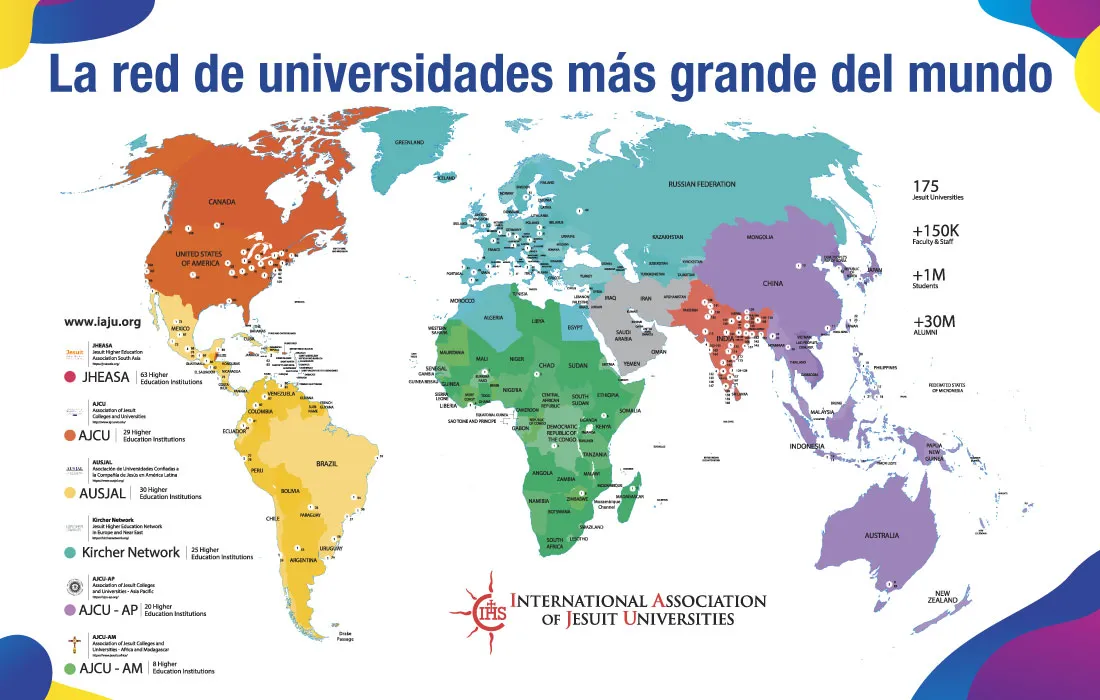This website uses cookies so that we can provide you with the best user experience possible. Cookie information is stored in your browser and performs functions such as recognising you when you return to our website and helping our team to understand which sections of the website you find most interesting and useful.
Jesuit University Networks: Lessons Learned
In a series of posts, we have shared with you some reflections on Jesuit university networks. In the first post, entitled “A vision on Jesuit University Networks,” we analyzed the context in which these networks have developed in recent decades and raised questions about their usefulness and the circumstances that make their creation desirable. In the second post, we reviewed the main challenges and risks associated with Jesuit university networks, as well as the essential conditions for their functioning. Now, in this third and final article of the series, we will synthesize the lessons learned and good practices that emerge from the creation and operation of these networks.

The following aspects can be identified as determining and essential factors for the good performance of university networks.
Specific objectives and results
1. It is essential to identify achievable common projects that add value to the university mission of most Jesuit institutions and professionally enrich counterparts. This builds trust and strengthens collaboration.
2. The network should focus on concrete projects in themes and areas strategic to the identity and mission of the educational apostolate of Jesuit universities. It should be clear that networks do not replace the functions of universities and the responsibility of university authorities to ensure the renewal of Ignatian identity and mission.
3. Another key lesson is the need to develop a limited number of projects that add value to the mission of the participating institutions. Rather than spread across multiple initiatives, it is more effective to concentrate resources on high-quality projects that can be shared by as many institutions as possible. This not only maximizes impact, but also fosters effective collaboration.
Inclusive collaboration
4. It is unlikely that all universities and centers will participate in all projects. However, networks must meaningfully and equitably integrate a wide diversity of individuals and institutions. To do so, they must be flexible and agile enough to adapt to the differences and richness that arise from this diversity of Jesuit universities and centers of higher education.
Resources, inputs and capabilities
5. It is crucial to find a balance between the visions and expectations that universities have about the network and the human and economic resources allocated to it.
6. Network projects, in addition to adding value to the mission of the universities, must take into account the needs and capabilities of the members, as well as the resources of the network. Therefore, common projects must be feasible and sustainable.
7. Given that resources are often limited, the strategy of developing networks incrementally, focusing on achievable projects that demonstrate the benefits of collaboration, has proven to be highly effective.
Political will and leadership
8. The support of rectors and deans is fundamental. In return, regular accountability and communication with university authorities are key.
9. Participation in peer networks and projects is voluntary, but once approved by the rector the university is accountable for the commitments made.
10. Decision-making should combine top-down strategic orientations with bottom-up considerations and availability of members. Authority and power conflicts in networks are reduced when decisions are made in a participatory manner and network and project coordination is recognized by the participants.
11. It is important to empower members and network. Likewise, it is essential that both universities and networks recognize and value the time that participants dedicate to common projects.
12. In a university network, participating academics and administrators are considered “primus inter pares”. However, it is essential to have people to help overcome the collective action problems inherent in the creation and operation of the network. This responsibility falls largely on the central teams.
13. The style of leadership in university networks should be characterized by active listening and sharing responsibilities, since it is a collective effort. It is essential to identify and train people with the necessary skills and competencies for networking, as these are essential for leading, negotiating, demonstrating resilience, maintaining perseverance and fostering teamwork.
Management, articulation and governance
14. Central coordination of the network is of vital importance and requires a team. The size of the team will depend on the scope and complexity of the network. In addition, it is crucial to establish effective coordination of the various groups and projects within the network. It must be made clear that the university coordinating the group or project is providing a service and, furthermore, that the products are collective.
15. Harnessing the collective intelligence present in a network is part of the purpose, and to achieve this, it is desirable to decentralize leadership and encourage shared decision making. The combination of decentralization with efficient coordination (coordinated decentralization) has proven to be an effective strategy in network management.
16. It is fundamental to establish a clear definition of the institutional articulation of the network with the governance structure of the Society of Jesus, both at the regional and global levels. This implies the coordination of efforts with the regional conferences of provincials and with the Secretary for Higher Education, as well as with the International Association of Jesuit Universities (IAJU).
17. In order to take advantage of synergies and avoid duplication of efforts, it is essential to foster communication and coordination between the university network and other Jesuit networks at the regional and international levels. It is not necessary to wait until the network itself is fully consolidated before beginning to explore opportunities for collaboration with other networks of the Society of Jesus.
Follow-up and accompaniment
18. Planning should adopt a pragmatic and simple approach, based on reaching agreements among member institutions that define clear, feasible and sustainable objectives to be achieved by the network.
19. It is essential that the central coordination of the network accompanies, advises and continuously monitors the groups and projects.
20. The methodology of project formulation and follow-up, with definition of activities, results and schedules, increases the success of the network.
Bonds of trust
21. Networks are the collaborative links that are established between people. It is therefore vital that the members of a network know each other and develop a high level of trust among themselves. Each participant must be confident that his or her colleagues possess the necessary academic and managerial skills and commitment required to deliver effectively, on time and with excellence on project commitments.
In the academic context, this trust is also closely related to the academic prestige of both the individual participants and their respective university institutions. Therefore, achieving the level of trust and knowledge necessary for networking is a time-consuming process that requires the creation of spaces where participants can interact on a human level and establish solid connections.
Effective and fluent communication
22. Without effective and fluid communication, an effective network cannot exist. Communication must be constant between the institutions, the central coordination and the network members.
23. Likewise, the work of disseminating the activities of the network and communication with other Jesuit works and networks, as well as with the Church and the non-Jesuit academic world, are key elements in strengthening the presence and public knowledge of the network.
Valuing diversity and managing asymmetries:
24. Recognizing and managing differences and asymmetries among members is crucial. As mentioned in previous articles, Jesuit higher education institutions are very diverse, both in terms of size and in terms of contexts and languages, which often results in significant asymmetries among them. To illustrate this point, it is common to observe that larger universities tend to believe that networking, while mission-oriented, can limit the ability to achieve results effectively and efficiently. These institutions often believe that they could achieve these outcomes more effectively if they were to lead or undertake projects on their own or in collaboration with institutions of equal or greater academic standing than themselves.
On the other hand, smaller institutions face the challenging task of managing their activities with limited resources, which may lead them to believe that they do not have the necessary resources to participate in networked projects. In the worst case, they may fear that their contribution will be diluted in initiatives led by larger universities.
Fortunately, in recent years and in several regions we have seen a significant increase in the number of larger universities that are willing to lead networks and strategic projects. In parallel, we have also noticed an increase in the number of smaller institutions in various regions that are willing to take on the challenge of collaboration.
As a lesson learned, we see that perhaps the most important and complex task of managing a network is to be aware of and capable of valuing and managing the differences and asymmetries among members. Collaboration between institutions with different capacities is not only characteristic of the culture of generosity. All institutions and individuals gain from the exchange.
In conclusion, Jesuit university networks offer a powerful platform for collaboration among diverse institutions in pursuit of common goals. These lessons learned and best practices provide a solid framework for the successful development and operation of these networks, which play a fundamental role in strengthening the Jesuit educational mission and its impact on society.





